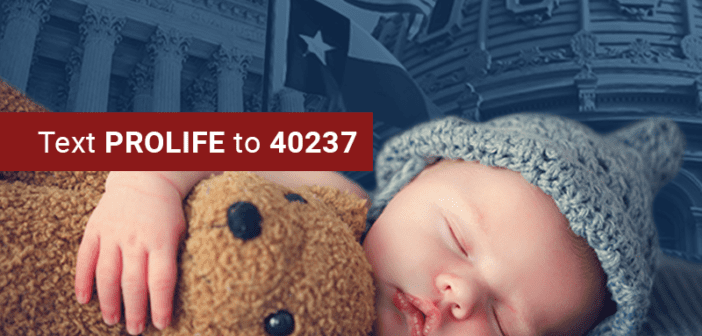Last week, a first draft of the Supreme Court of the United States’ (SCOTUS) opinion on Dobbs v. Jackson Women’s Health Organization leaked to the public, causing shock and immediate intense reactions worldwide. While the Pro-Life side met the news with cautious optimism, the anti-Life side reacted with anger and fury.
The possibility that America might be rid of Roe v. Wade and Planned Parenthood v. Casey has never seemed more likely. Since the leak went public, people on all sides of the issue have been speculating about abortion’s future should the court’s final ruling overturn Roe and return the abortion question to the states.
The question Texans want to know is; “What will happen to abortion in Texas?”
Last year, in addition to the Texas Heartbeat Act, Texas passed what is known as an abortion “trigger ban” (House Bill 1280 by Representative Giovanni Capriglione and Sponsored by Senator Angela Paxton). HB 1280 did not immediately stop any abortions, and instead was set to become effective at some unforeseen date. For this reason, the trigger ban was largely overshadowed by media reactions to the Texas Heartbeat Act, which took effect in September and began saving lives. Some ignored the trigger ban since all of Texas’ pre-Roe abortion statutes, including a full abortion ban, would become re-enforceable once the court overrules its previous decision. Still, since the leak has seemed to signal a hopeful end of Roe v. Wade, the trigger ban passed in Texas and similar laws passed in twelve other states are now receiving more attention.
Like other Pro-Life laws, a trigger ban protects Life by banning abortion to some extent. The difference is that rather than taking effect on a specific date, like most laws, a trigger ban becomes effective after being triggered when a certain event takes place.
The Texas Heartbeat Act was designed to go into effect on September 1st, 2021. HB 1280, the trigger ban passed in Texas, will become effective when SCOTUS wholly or partially overturns Roe. HB 1280 will ban abortions to the greatest extent possible under the new judicial framework.
According to the pro-abortion Guttmacher Institute, thirteen states have passed trigger bans, which will outlaw abortion once SCOTUS overturns Roe. The states with said trigger bans are: Arkansas, Idaho, Kentucky, Louisiana, Mississippi, Missouri, North Dakota, Oklahoma, South Dakota, Tennessee, Texas, Utah, and Wyoming.
When HB 1280 takes effect committing an elective abortion will be a first-degree felony, with the added liability of a $100,000 civil penalty from the Attorney General of Texas. Unlike the Texas Heartbeat Act, the physician is the only person who can be prosecuted under the trigger ban. This means that anyone aiding and abetting an abortion would not face criminal penalties, and only the Texas Attorney General can bring a civil case against those that violate the law. Just like the Texas Heartbeat Act, the mother would face no penalties.
The only exception for abortion in HB 1280 is in cases where the mother “has a life-threatening physical condition” such that her pregnancy places her at risk of death or “substantial impairment of a major bodily function.” Each of the other twelve trigger laws contains a similar exception, and a handful contain exceptions for rape, incest, or disability of the preborn child.
On top of the trigger ban, Texas and many other states still have their pre-Roe abortion bans on the books. These states never repealed those statutes, which Roe and other court rulings only made unenforceable for the time being. If and when Roe and Casey are overturned, those laws would once again become enforceable. Along with these, any other state pre-viability bans that have been enjoined by the courts for the last 50 years would become active and enforceable.
Alabama, Georgia, Iowa, Ohio, and South Carolina don’t have trigger laws, but instead have abortion bans passed since 1973 that would become enforceable. Arizona, Michigan, and Wisconsin have not passed abortion bans since 1973, but their pre-Roe bans would go back into effect.
Even after these bans go into effect, there is still a long way to go to heal the gaping wound that abortion has left on our nation. Primarily, we need to make sure that the abortion industry is held accountable to the law so that abortions actually stop. With the Texas Heartbeat Act, we have seen how civil enforcement is the most effective means for holding the abortion industry accountable. Thus, it is urgent that we maintain this private enforcement mechanism for Pro-Life laws for the foreseeable future.
Further, Pro-Lifers must acknowledge that women and children will need more help than ever. Texas and the United States will need to invest in these individuals, making sure we are truly Pro-Life in addition to being abortion-free.
This is an extremely exciting time for the Pro-Life movement and for preborn children. In total, approximately 26 states have laws entirely or almost entirely banning abortion that could go into effect when SCOTUS overrules Roe. Though the fight to defend all innocent lives will not be over even when Roe is overturned, it is exciting to know that tens of thousands of preborn children will be protected. Now we must pray for the SCOTUS justices to remain resolute and issue a just opinion to finally rid our nation from the stain of Roe.


